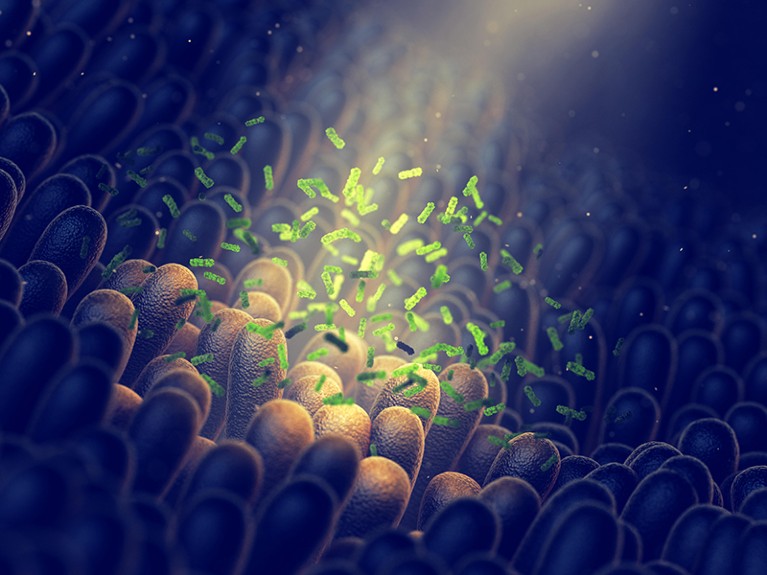
Credit: nobeastsofierce Science / Alamy Stock Photo
The commensal bacteria that colonize the gastrointestinal mucosa profoundly affect host physiological functions including metabolism, cellular proliferation, inflammation and immunity. These effects are driven by the ability of resident bacteria to produce small molecules and metabolites as well as to coordinate cross-talk with host immune cells both at the intestinal barrier and systemically. Many current cancer therapies rely on stimulation of antitumour immune responses, but whether the gut microbiota might influence host responses to cancer therapeutics via the immune system was largely unknown.
In 2013, two seminal studies from the groups of Laurence Zitvogel and Giorgio Trinchieri shed light on this idea. In tumour-bearing mice that lacked microbiota, either through treatment with antibiotics or using germ-free animals, the authors demonstrated that priming of both the innate and adaptive immune system by an intact gut microbiota is crucial for the effectiveness of three anticancer regimens. Iida et al. showed that the responses to CpG oligodeoxynucleotide (ODN), oxaliplatin chemotherapy and blockade of the interleukin receptor IL-10R are attenuated in tumour-bearing mice lacking gut microbiota. Mechanistically, in the case of CpG ODN, this effect is the result of decreased tumour necrosis brought about by decreased production of inflammatory cytokines from insufficiently primed tumour-infiltrating innate myeloid cells. In the case of oxaliplatin, a lack of production of reactive oxygen species by non-primed myeloid cells is partially accountable for the lower genotoxicity of the chemotherapeutic drug in the absence of a gut microbiota.
In a study by Viaud et al., naive mice treated with the chemotherapeutic drug cyclophosphamide (CTX) displayed compositional changes in the small intestinal microbiota and accompanying disruption of the intestinal barrier, thus leading to the translocation of select Gram-positive bacterial species into secondary lymphoid organs. Once in the spleen, the commensal bacteria induced a robust adaptive immune response characterized by type 17 helper T cells (TH17) and memory type 1 helper T cells. Indeed, the therapeutic effect of CTX on tumours was mitigated in germ-free or antibiotic-treated mice, and was partly reinstated with the adoptive transfer of TH17 cells, thus underscoring the profound effect of the microbiota in treatment outcomes.
In 2015, two studies went further and pinpointed distinct bacterial species responsible for the modulation of antitumour immune responses under therapeutic pressure. Efforts from the groups of Thomas Gajewski and Zitvogel aimed at exploring the effects of the gut microbiota specifically in the context of immune-checkpoint inhibitors (ICIs), which elicit T cell responses to tumours. Comparing genetically similar mice purchased from two different companies known to have varying compositions of commensal microbiota, Sivan et al. revealed differences in subcutaneous melanoma outgrowth that are attributable to tumour-specific T cell responses. Subsequently, Bifidobacterium spp. were identified by profiling the gut microbiome through sequencing of 16S ribosomal RNA and were found to be associated with both delayed tumour growth and optimal responses to an anti-PD-L1 ICI in mice. Similarly, Vétizou et al. found that the immunostimulatory activity and tumour control of CTLA-4 blockade that is decreased in germ-free or antibiotic-treated mice is restored after oral gavage with specific Bacteroides spp., particularly B. fragilis.
Until that point, most of the important initial insights into how the gut microbiota sets the inflammatory tone during therapy had come from preclinical mouse models. Consequently, growing impetus prompted researchers to evaluate whether similar observations could be made in patient cohorts. These efforts culminated in the 2018 publication of three parallel studies led by Zitvogel, Gajewski and Jennifer Wargo, which used metagenomic shotgun sequencing of patient stool samples to demonstrate that the efficacy of anti-PD-1 ICIs in people with melanoma and epithelial tumours is shaped by gut commensal bacteria.
Compositional differences in the gut microbiota were associated with clinical responses to ICIs. Importantly, reconstituting germ-free mice with faecal transplants from non-responding patients blunts the antitumour effects of PD-1 blockade by restraining local and systemic immunity, thus suggesting that the composition of the gut microbiome might be one factor accounting for primary resistance to ICIs. Unexpectedly, across these studies, little overlap was found in the specific bacterial taxa or species correlating with successful response, thus prompting the researchers to speculate on the variables that might account for these differences, such as the techniques used to analyse patient samples, geographical diversity, and diet and lifestyle factors.
Confirmation that gut microbial communities are an influential force mediating responses to a range of therapeutic modalities has raised the intriguing possibility that microbe-based therapies could eventually be implemented in clinical settings. For example, manipulating the human gut microbiota could take the form of dietary interventions and prebiotic supplementation, faecal microbiota transplantations, and administration of bacterial consortia or probiotics. However, before these possibilities can come to fruition in treating patients, more work is needed to identify and validate reliable predictive microbiome biomarkers and to fundamentally define what truly constitutes a favourable microbiome that can drive effective cancer therapy responses.

 Nature Milestones in Cancer: Interactive Timeline
Nature Milestones in Cancer: Interactive Timeline
 Commensal bacteria control cancer response to therapy by modulating the tumor microenvironment. (Iida, N. et al., 2013)
Commensal bacteria control cancer response to therapy by modulating the tumor microenvironment. (Iida, N. et al., 2013)